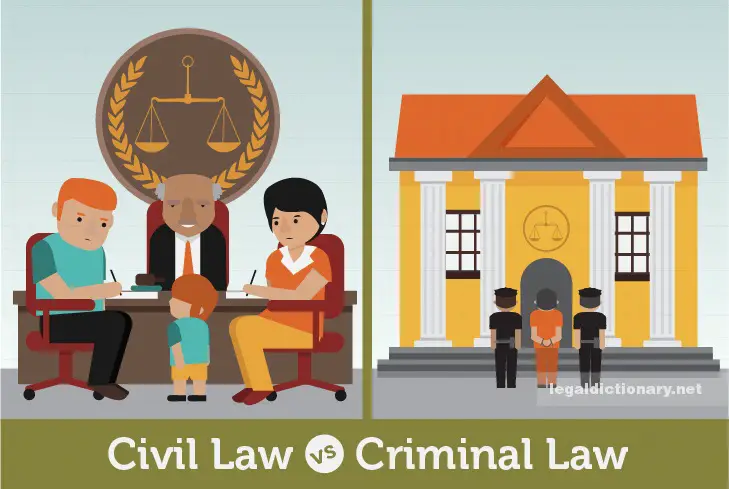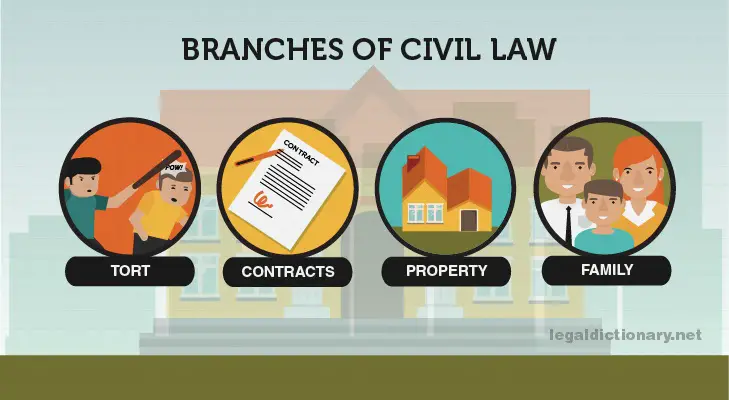How to File Family Law Ex Parte Placer County
Civil law is a body of rules that defines and protects the private rights of citizens, offers legal remedies that may exist sought in a dispute, and covers areas of law such as contracts, torts, property and family law. Civil constabulary is derived from the laws of ancient Rome which used doctrines to develop a code that determined how legal bug would be decided. To explore this concept, consider the following civil law definition.
Definition of Civil Law
- Noun. The body of laws that govern ordinary private matters, dissever from laws presiding over criminal, war machine, or political matters.
- Noun.The body of law that governs private or civil rights, providing redress for wrongs by compensating the person or entity that has been wronged rather than punishing the wrongdoer.
Origin:Late circa 1400 Late Middle English jus cilile
What is Civil Law
Emperor Justinian I ruled ancient Rome from 527 A.D. to 565 A.D. One of his lasting legacies is his rewriting of Roman law in "Corpus Juris Civilis," ("Body of Civil Law") which all the same serves as a footing for modern civil police systems worldwide.
In the United States, ceremonious law has a couple of different meanings. In most parts of the U.Southward., civil law is synonymous with "common law," or "judge-made law" which relies on prior courtroom decisions to determine the event of cases. The governing principle is "Stare Decisis," which ways that the upshot of a lawsuit depends on the outcomes of previous similar cases.
Civil Police vs. Criminal Law

Civil police force and criminal police serve dissimilar purposes in the U.s.a. legal system. The chief purpose of civil law is to resolve disputes and provide compensation for someone injured by someone else's acts or behavior. The primary purpose of criminal police is to prevent undesirable behavior and punish those who commit an human action deemed undesirable past guild.
In ceremonious law, information technology is the injured person who brings the lawsuit. By contrast, in criminal law, it is the government that files charges. The injured person may file a complaint, simply information technology is the government that decides whether criminal charges should be filed. A violation of criminal law is considered a crime against the land or federal government and is a violation of public police rather than private police force. Civil law cases are concerned but with private law. In some instances, a person may be entitled to file a complaint, trusting the legal system to punish the wrongdoer with prosecution, while bringing a ceremonious lawsuit to receive bounty for the damages done by the wrongdoer.
Some other primal departure between civil and criminal police is the standards of proof required to reach a verdict. A plaintiff demand merely prove his civil law example past a "preponderance of testify." This standard requires that the plaintiff convince the court that, based on the show presented at trial, information technology is "more likely than non" that the plaintiff's allegation is truthful.
In contrast, the standard of proof is higher in criminal police force proceedings. The state must prove their case "beyond a reasonable dubiety." The reason for this higher standard is because a person'southward freedom is at stake, and the primal belief that convicting an innocent person is worse than assuasive a guilty person to go free.
Branches of Ceremonious Law

Civil law cases are divided into four primary categories, each covering a range of problems. Meet below for the types of ceremonious cases and corresponding civil law examples.
Contract Police
Contract law deals with agreements between 2 or more parties, each of which is obligated to hold upwardly their portion of the understanding. For example, two parties enter into an agreement for the lease of an flat. The Lessor has the right to apply the apartment, and the landlord receives rent money as compensation. If one political party violates whatsoever of the provisions of the contract, they have committed a civil wrong known as "breach of contract." Generally speaking, contracts may be oral or written, however in that location are certain types of contracts that must be put in writing.
Tort Law
Tort constabulary is a branch of civil law that is concerned with personal injury and civil wrongdoing. A tort is a civil incorrect, done by ane person or entity to some other which results in injury or property harm, and oftentimes involves monetary compensation to the injured political party. There are 3 categories of torts: negligence, intentional tort, and strict liability.
Negligence is an unintentional tort, to which in that location are four elements that must be satisfied.
- Duty. The defendant had a duty to act in a reasonable manner
- Alienation of Duty, meaning that the defendant failed to deed reasonably
- Causation. The defendant's alienation of duty must be the crusade of the plaintiff's injury or loss
- Damages. Budgetary, holding, or other loss
An intentional tort is a deliberate wrongdoing in which the defendant acted with intent to cause harm or injury. Some examples of intentional torts include: assault and battery, false imprisonment, fraud, invasion of privacy, and intentional infliction of emotional distress.
Strict liability is a tort that does not require actual negligence or intent to hurt. It is based on an absolute or "strict" duty to ensure something is safety. Strict liability oft comes into play with hazardous activities, such every bit bungee jumping. The company that owns the bungee cords, or offers the activity to consumers, has an absolute duty to make sure the bungee cords are intact, hooked up correctly, and are ready to operate safely. If a consumer is injured considering the cord breaks or comes undone, the visitor is liable for the injury under strict liability.
Property Law
Property constabulary covers both personal belongings and real property. Personal property can be tangible, such every bit jewelry, animals, and merchandise, or intangible such as patents, copyrights, stocks, and bonds. Real holding refers to land and anything built on it that cannot be easily removed, as well as annihilation under the surface of the land, such every bit oil and minerals. At that place are two types of holding police torts: trespass and conversion.
- Trespass to chattels refers to a defendant intentionally and physically interfering with the plaintiff's right to possession and utilise of their personal property.
- Trespass to land occurs when a defendant enters plaintiff's private property without consent of the plaintiff.
- Conversion refers to a defendant depriving a plaintiff of their personal holding without the plaintiff's consent, and and so using the plaintiff'due south property equally his own.
For example, a lady sees her neighbor planting flowers in her garden, and notices she has five extra containers of flowers with no place to found them. The lady decides she would like flowers in her garden as well, and takes the leftover containers of flowers without request for permission from neighbor. The lady deprived the neighbor of her flowers, planting them instead in her own garden. The lady has committed conversion.
Family unit Law
Family police is the branch of civil law that deals with marriage, divorce, annulment, child custody, adoption, birth, child support, and whatever other bug affecting families. This co-operative of civil police is unique in that there is non necessarily a person who committed a civil incorrect. This is especially true in states that have no-mistake divorces. The family court gets involved with dividing upwards property and finances afterward a divorce, establishing kid custody, kid support, and spousal support among other things. Some newer areas that autumn under the family unit law umbrella are aforementioned-sex wedlock, artificial formulation, surrogate motherhood, in vitro fertilization, and palimony.
Ceremonious Case Instance
While the lawsuit against McDonald's made national headlines, the facts of the case regarding negligence, lacking product, and breach of implied warranty brand a fascinating ceremonious case.
Liebeck v. McDonald's Restaurants CV-93-02419, 1995 (N.G. Dist., Aug. 18, 1994)
This instance began when 79-twelvemonth-old Stella Liebeck, who was a rider in her grandson's machine, purchased a cup of coffee at McDonald'southward drive-through. While the automobile was still parked, Liebeck removed the hat from the loving cup to add some creamer to her coffee, inadvertently dropping the loving cup and spilling the scalding hot coffee on her lap. Liebeck suffered third-degree, deep tissue burns on her legs that required multiple surgeries and skin grafts.
Liebeck filed a civil lawsuit against McDonald'due south for her injuries nether the torts of strict liability and negligence. This instance was controversial in that the media portrayed Liebeck'due south ceremonious lawsuit every bit frivolous considering she was suing over coffee beingness too hot. However, the amercement to her body, her pain and suffering, loss of income, and loss of enjoyment in life due to pain were real and she did prevail in courtroom. The jury found that the defendant's product (the coffee) was defective (too hot to drink) and this constituted a breach of implied warranty (the assumption that the coffee was safe to drink). The jury also plant that Liebeck was twenty percent at fault for her injuries.
Related Terms
- Preponderance of Evidence – the standard of proof used in most civil trials; the jury is instructed to find for the political party that has the stronger bear witness, even if information technology is just marginally stronger than the other side.
- Beyond a Reasonable Doubtfulness – the standard of proof used in criminal trials; a reasonable person would believe that the defendant is guilty of the offense; a higher standard than is used in civil constabulary.
- Common Law – the trunk of law that is based on judicial decisions.
- Stare Decisis – the doctrine that requires judges to utilize prior cases as precedent on which to decide current cases.
- Case Law – judge-made constabulary; law that is found in collections of reported cases.
- Chattels – an item of tangible, movable holding; possessions that can exist moved from one identify to another.
- Lessor – a person who leases or rents out a property; a landlord.
- Lessee – a person to whom a charter is granted; a tenant or renter.
Source: https://legaldictionary.net/civil-law/
0 Response to "How to File Family Law Ex Parte Placer County"
Post a Comment